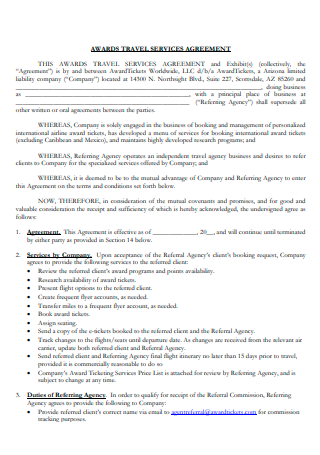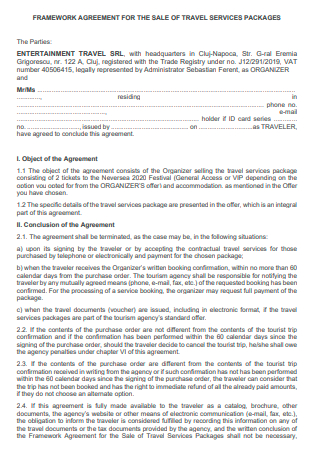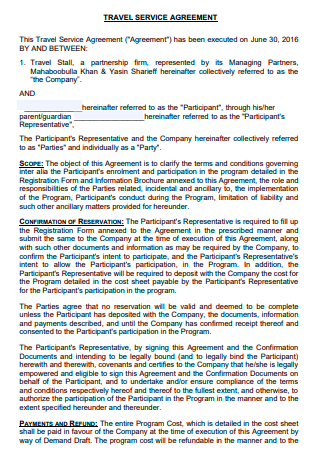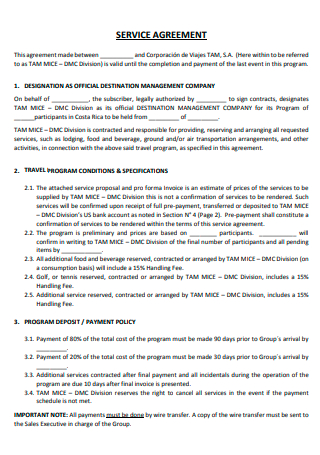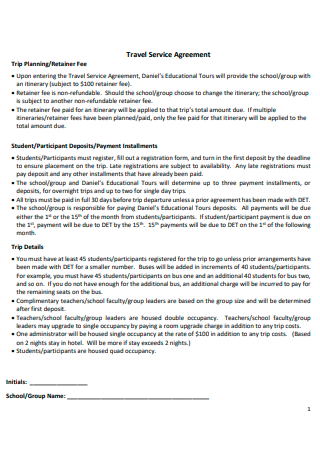4+ Sample Travel Services Agreement
FREE Travel Services Agreement s to Download
4+ Sample Travel Services Agreement
What Is a Travel Services Agreement?
What Is the Importance of Travel Services Agreement?
What Are the Advantages and Disadvantages in Outsourcing Travel Services?
6 Basic Functions of a Travel Services:
What Are the Needed Travel Documents?
What Is the Liability of a Travel Service?
FAQs
1. How much do travel agents make annually?
2. How much does a travel agent make per booking?
3. How do I cancel a travel services agreement?
4. Is there a travel insurance?
What Is a Travel Services Agreement?
A Travel Services Agreement will make it clear and understandable that the client permits the travel agent to make bookings on their behalf. The terms and conditions of the travel service provider will apply to all bookings made by the travel agent on behalf of the client, together with the terms relating to cancellations and refunds.
This agreement begins on the date the document is signed or the date the booking is placed through the travel service and shall continue for the duration of time the travel management services is provided. This agreement may be terminated by either party upon three months written notice.
Moreover, travel agents make this process convenient for their customers in addition to providing entire travel packages and consultation services. They may book cruises, flights, rental cars and hotels, as well as resort stays and events. Agents accommodate a large demographic—serving both individuals and businesses.
What Is the Importance of Travel Services Agreement?
The provider of your travel service will have its own terms and conditions such as flight or freight conditions of carriage or accommodation or car hire terms. All such terms and conditions—including limitations of liability—apply to any travel service booked pursuant to the agreement and, accordingly, shall mean that the terms and conditions set out herein; the terms and conditions set out in your credit account approval letter (if there are any) and; all terms and conditions of any provider of your travel services. To the extent of any discrepancy between a travel service provider’s terms and conditions and the terms and conditions set out herein, the travel service provider’s terms and conditions shall prevail, save to the extent that any provision in the travel service provider’s terms and conditions is considered to be invalid or unacceptable. Your travel service providers will be acknowledged on your itinerary or travel documents and their respective terms and conditions will be accessible directly on their websites or through contacting them. It is advisable that you read all valid travel service provider terms and conditions cautiously because in every case they will apply to the provision of your travel services.
What Are the Advantages and Disadvantages in Outsourcing Travel Services?
Outsourcing business travel arrangements is not just easy, but smart. There are some disadvantages which have to be considered but for some companies, outsourcing travel management is the right business option.
It can be a challenge trying to balance being financially responsible with being efficient. Corporate travelers need to have certain travel requirements fulfilled because their needs are not the same as someone travelling for leisure. But then, the finance managers and corporate executives need to have precise financial statements and it all has to be done speedily.
Many bigger companies employ travel managers who can manage both halves of the task as travel is one aspect of a business that involves many components, and they all have to function together. It has to be fiscally responsible and that involves having the finance manager review the process because it has to work properly for the businessperson taking the trip.
There is the question of who will oversee each trip to ensure that it meets all of the needs of companies who choose to handle travel arrangements themselves. It can be hard for a finance manager to grasp the complex language of travel and still maintain the business needs. He or she then ends up looking to the various travel providers for help.
Travel management companies can manage the stress and strain of travel bookings for a particular company. The use of a travel service has been progressively rising over the last five years for many reasons, not the least of which is taking the challenges off of the finance manager and giving it to a group that understands and can do what is needed efficiently. It also means that the basic mistakes in the processes are also handled by a firm that has the knowledge to understand the language and has the ability to negotiate with the providers for the best rates possible.
Another benefit to making use of an outsourced company is that it is a fixed rate, and not subject to additional costs like outlying benefits. Because there are companies who employ a lot of people who travel, it becomes particularly cost-effective to outsource since, one travel agency can handle the full account, and it stands to reason that a company may end up apprehending a cost savings by using a travel management service.
At the minimum, it should be a very similar cost annually and one may not be able to realize a financial savings by outsourcing. That being said, it is wholly possible that the rates the travel services can negotiate with several companies will not be the same as the ones negotiated directly by the company.
6 Basic Functions of a Travel Services:
Today, when a company needs the services of a travel management agency, it not only seeks someone to manage its travel arrangements, since this can be done within without much trouble using online tools, but also has other needs and expectations.
An agency of this type needs to take on the role of a reliable partner within the travel construction at the companies that it serves. To do this, it has to work closely with the travel agent or the person responsible for travel within the company.
The role of most agencies has been expanded into a series of services that can be separated into six main areas:
What Are the Needed Travel Documents?
In travel documents, it should comprise airline tickets, hotel vouchers, rental car vouchers or any other document—whether in electronic form or printed—to check an arrangement with a travel service provider. Travel documents may be subject to certain conditions and/or restrictions including, but not limited to, being non-refundable, non-transferable, non-date-changeable, and subject to cancellation and/or amendment fees. Travel documents cannot be transferred to another person to use. Every airline, boat, or bus ticket must be issued in the name of the holder of passport, identification card, or other photo identity. An incorrect name on a booking or on the travel documents may result in an inability to travel on that booking and the booking will be cancelled. It is best if you review your travel documentation rationally and advise the agency immediately of any errors in names, dates and timings. You must make sure you have all your travel documents and e-tickets prior to travel. If you believe you have not received any required documentation, you may contact the agency right away.
All departure/arrival times are provided by the airlines concerned and are estimates only, which means a flight described on your travel documents and/or itinerary as “direct” will not necessarily be non-stop. They may change due to weather conditions, air traffic control restrictions, and operational requirements.
What Is the Liability of a Travel Service?
A company should exercise care in the selection of reputable travel service providers but since they have no control over, or liability for, there are services provided by third parties. Travel services are responsible to ensure that they process bookings with rational skill and care and, accordingly, their liability to you (except for fraud, or death or personal injury caused by their negligence) will be limited to supplying the relevant service again or paying the cost of having the relevant service supplied again. This accountability will also be limited to the extent that any related international conventions limit the amount of compensation which can be claimed for death, injury, or delay to passengers and loss, damage and delay to luggage.
Here are some of the legal theories under which travel agents or agencies have been sued (in addition to the travel supplier or tour operator actually providing the service or accommodation) include:
- Failure to Disclose Health and Safety Hazard Information: While the travel agent normally has no duty to investigate ultimate service providers for compliance with safety and health laws, the agent may be jointly liable in circumstances where the agent knew or should have reasonably known of specific risks and did not communicate them to the traveler. Some jurisdictions have found travel agents liable for failure to investigate crime levels in destination areas or advise of epidemics or needed shots/vaccines, or advise of need for travel insurance.
- Failure to Disclose Identity of Supplier: A travel agent must disclose the identity of a supplier or tour operator ultimately responsible for delivering the travel services. If the agent fails to make such a disclosure, the agent may be jointly liable for any harm or injury caused to the traveler by the supplier or tour operator.
- Assuring the Reliability of Suppliers or Tour Operators: By doing so, the travel agent may be jointly responsible for harm or injury to the traveler under a variety of legal theories, including breach of warranty and negligent or fraudulent misrepresentation.
FAQs
1. How much do travel agents make annually?
Host Agency Reviews and the Bureau of Labor Statistics (BLS) found some common ground in regard to the average salary of a travel agent. In 2019, the BLS currently lists the average travel agent salary as $44,690 with a range of $23,360 and $69,420 dividing the lower to upper 10% of travel agents.
2. How much does a travel agent make per booking?
Across the board the average commissions are 3% for Internet bookings, 3-5% on promotional rental rates and 10% on leisure rates booked through GDS distribution channels. Some offer a scanty $2 per reservation (regardless of value), while others based on incentives and productivity will pay commissions as high as 20%.
3. How do I cancel a travel services agreement?
Cancelled bookings may incur charges. Regardless of whether travel has commenced, these charges can be up to 100% of the cost of the booking. Fees and extra charges may also apply where a booking is changed and when tickets or documents are re-issued. Where there is an incurred liability for a travel service provider cancellation fee or charge for any booking which you cancel, you agree to indemnify the amount of that fee or charge. Where you seek a refund for a cancelled booking for which payment has been made to the travel service provider, there will be no refund to you until there are funds received from that travel service provider. If you have purchased a return flight, multi-stop or round the world flight and you do not check in on a confirmed flight, the airline will register you as a ‘no show’ and your tickets on your subsequent flights may be cancelled.
4. Is there a travel insurance?
For every travel, it is highly recommended that you take out appropriate travel insurance to cover your travel arrangements. It is your responsibility to ensure you have valid travel insurance that covers and is appropriate for your needs. The travel service will not be liable for any loss you incur if and to that extent as you are able to claim for damages under a travel insurance policy. However, an agency can arrange travel insurance for you or provide you with a quote or general information about the travel insurance options available to you.
Travel services will arrange or book your dream vacation for you. While they may offer different travel packages with discounts and special offers, they may also prepare everything you need, from reservations to actual accommodations.
As a traveler, it is very much important for you to know your responsibilities in terms of preparing all documents needed, getting to the airport, and just making sure you look after yourself in the whole trip.
Traveling is essential especially for those who need to breathe and relax. So, make sure your budget is ready and be certain about the travel agency that you will be trusting.

